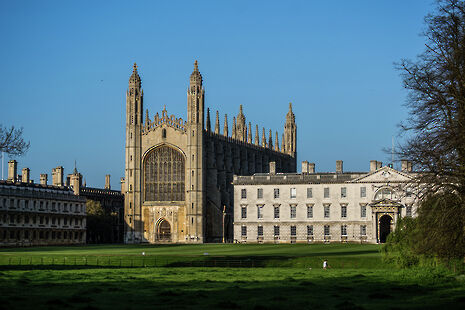Over 300 senior University members sign open letter against Brexit
The signatories argue British universities are “significantly helped by support and funding from the EU”

Over 300 Cambridge academics have signed a letter arguing against Britain leaving the European Union, weeks before the referendum on the 23rd June.
The letter, which is open to signatures from any members of the Regent House, initially signed by several heads of house and professorial fellows, also bears the signature of other fellows and senior members of the University who have expressed their support.
With the debate about Britain’s continuing membership of the European Union becoming increasingly fraught in national media, the letter draws attention to the benefits the academic community and young people draw from the UK being part of the continent-wide union of 28 member states.
The letter argues that British universities, ranked among the most successful centres of learning and research anywhere in the world, are “significantly helped by support and funding from the EU”.
The letter was published on the website of the local ‘Cambridge for Europe’ campaign, whose patrons include local Labour MP Daniel Zeichner, former cabinet minister Charles Clarke and Dr Julie Smith, a Cambridge academic specialising in European politics.
Last week, a report from the cross-party Treasury select committee accused both sides of the EU referendum campaign for their tactics, including the use of questionable ‘facts’ to bolster their arguments. The 83-page report was particularly scathing of the Leave campaign’s main assertion, that leaving the EU would save £350 million a week.
The academics’ letter illustrated that British universities in fact “received a more than proportionate share of funding from the EU” and that despite accounting for 12 per cent of the EU’s population, the UK is home to 22 per cent of European Research Council grant-holders. It also highlighted that young Britons gain a considerable amount from having access to EU scholarships, stressing “the importance of the free exchange of ideas, research and information that is made possible by the free movement of academics within Europe”.
The letter was organised by Matthew Bullock, who since 2014 has been the Master of St Edmund’s College. The 307 signatories represent a cross-section of different faculties, ranging from the humanities and language departments to the sciences.
It is not the first time University of Cambridge academics have written to express their opposition to a possible Brexit. Two months ago, Stephen Hawking and 150 Royal Society fellows warned that quitting the EU would prove a “disaster for UK science”, in their letter to The Times in March. Hawking was joined by economists, mathematicians, engineers and scientists who argued that Britain’s continued membership was important, citing “increased funding that has greatly increased the level of European science” and saying that “we now recruit many of our best researchers from continental Europe”.
Some academics and public figures have adopted the counter-argument. One letter, published by ‘Scientists for Britain’, claimed that, between 2007 and 2013, EU science networks funded only 3 per cent of UK expenditure on research and development.
With the referendum taking place in just over three weeks, polls suggest that it is still too close to call. The most recent YouGov ‘EU Referendum Tracker’, from last week, showed both the ‘Remain’ and ‘Leave’ campaigns neck-and-neck, with 41 per cent apiece – with 13 per cent undecided and the remaining four percent saying they would not be voting.
 News / Judge Business School advisor resigns over Epstein and Andrew links18 February 2026
News / Judge Business School advisor resigns over Epstein and Andrew links18 February 2026 News / Gov grants £36m to Cambridge supercomputer17 February 2026
News / Gov grants £36m to Cambridge supercomputer17 February 2026 News / Hundreds of Cambridge academics demand vote on fate of vet course20 February 2026
News / Hundreds of Cambridge academics demand vote on fate of vet course20 February 2026 News / CUCA members attend Reform rally in London20 February 2026
News / CUCA members attend Reform rally in London20 February 2026 News / Union speakers condemn ‘hateful’ Katie Hopkins speech14 February 2026
News / Union speakers condemn ‘hateful’ Katie Hopkins speech14 February 2026









